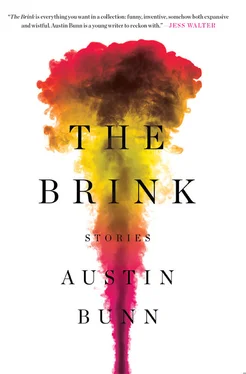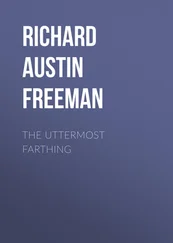“I took a Body Electric class once,” Ronnie says.
“Is that where they call it massage but you just end up jerking each other off?” Doug asks. It is, based on the longing in his face, a genuine question. Henry’s thoughts drift toward a class that is also, somehow, quasi-public group sex, and how anything gets done.
Ronnie dismisses Doug. “People think that because people are ashamed of their own body’s capacity for pleasure.”
“So it is about jerking each other off.”
“Jesus,” Ronnie says.
“Whatever you’re doing feels awesome,” Van says and begins, with drunken volition, a story about his ten-year-old son, his soccer games, and his growing pains, “leg cramps that got so bad he’d just ball up and cry.”
“You’re a dad?” Ronnie says.
Van marvels at a private happiness. “Yeah. You should try it. It’s amazing.”
Ronnie asks, “Where’s he now?”
Van doesn’t answer, seems to fall into himself. Ronnie’s hands pinch and knead his shoulders in what is a definitively nonerotic, fully half-assed massage. Ronnie mouths to Henry, Oh my God, did he die?
Henry sits up, summoned back into the present moment. “Look, just leave him alone.”
“What’d I do?” Ronnie says.
“Can’t you see he’s upset?”
But when Ronnie retracts his hand, Van grabs it and keeps it on him. He swipes his face and replies, “It’s fine. Keep going.”
Ronnie goes back to the massage and Van groans, a sound in their years of friendship Henry has never heard him make. With that single sound, the room suddenly seems more dense, a hot close dream. A tiny metallic clack: Doug undoing his belt. “That’s right,” Doug says, his eyes jumping all over Van’s body, like he’s checking to see how pieces of machinery come together. He kneels at Van’s side and rubs the inseam of Van’s pants and Van flinches.
“Just relax,” Doug says.
“What are you doing?” Henry asks quietly.
Doug pulls Van’s shirt up out of his waist and Henry catches a glimpse of a white blade of flesh at Van’s groin before he closes his eyes.
He hears the rustle and give of the leather recliner, the rake of Ronnie’s fingers. The teeth of a zipper giving way. It would be so easy for Henry to join. He’s close enough to feel the transgression with his hands. “Fuck yeah,” Doug says over and over, in a hungry loop.
He can’t watch Van be taken, fed upon. There are certain rules to things. Aren’t there rules? Henry walks calmly, decisively, out of the room, taking the stairs two a time, back to his room, where he sits on the bed, disoriented, his blood thumping. He throws open the window and gulps in the cold. Across the lawn, Jed, in his orange coat, treks in the fresh snow at the perimeter of the house lights. Henry calls out to him, the other exile, but Henry discovers he has nothing to say. So he waves hello. Jed waves back, sweetly, like they’re two boys departing from each other after an evening of play. Then he moves further and further out until Henry can no longer see him at all.
Henry wakes up in his clothes. He stares at Jed’s bed across the room until he realizes that it is immaculate, the way Jed had left it the night before. He never came back from his walk. The morning assembles itself, finally, as an emergency.
He searches the other rooms, the bathroom. Nothing. He’s not inside. Downstairs, Henry finds Van on the living room floor, cocooned in a crocheted blanket. His shoes and socks are off and Henry sees on Van’s foot a little meadow of hair split by a scar, a scar about which Henry will never know the story.
Henry nudges him awake. “What?” Van asks, bleary, and Henry stares at his face, slack from sleep, the closest he’ll ever come. And he feels nothing, the end of an idea. It’s not a kiss Henry wants, but a chance to be known, fully, in this life.
Henry says, “You need to leave.”
“Now?” Van says.
“Now.”
Bodi enters the living room and gives Henry a noncommittal nod. He’s not angry, or at least he’s oblivious; the men must have cleaned up, erased the night from the room. They will get away with it. Nothing will be noticed. Bodi goes to the front window to stare at the feet of snow piled on the lawn, the heap of the night’s weather.
“Everything went all right last night?” Bodi asks.
“Jed’s missing,” Henry says. “He went for a walk and never came back.”
Bodi’s face falls. “Oh, Christ, my fucking insurance.”
He rings the house bell and Doug and Ronnie collect in the foyer, purposefully missing each other’s eyes. “The kid went AWOL?” Doug asks. “Could have called that.”
Bodi asks them to go looking, and Henry’s first to be outside, happy to be free of the house. He punches through the snow, going to the trees, where he last saw Jed. At the edge of the forest, he turns back to look at the other men, splintering across the lawn. Van’s at his car, wiping the snow from the windshield, preparing to go. They see each other, for a moment, a final view, until Henry turns away. By Monday, Van will have quit and be moving to Florida.
About fifty yards into the trees, Henry comes across Jed’s body, propped against a spruce. At some point in the night, Jed unbuttoned his orange jacket, with nothing underneath. No shirt, just his skin exposed to the air and covered by a light ramp of snow. Henry kneels beside him, and Jed’s eyes open and find him. His face is glazed, but he’s alive. Inside the lining of Jed’s jacket, tucked in the pocket, is the spray paint can with a red cap.
“Leave me here,” Jed says, barely over a whisper. “I’m not right.”
Henry takes the cylinder of paint from the jacket and palms it. The metal is frigid to the touch, nearly empty, and the ball clacks inside. Henry tosses the can into the woods, as far as he can. It’s a good throw, a good release. “You’re coming with me,” Henry says, committing to it. Then he curls his arms around the boy and lifts.
P.S. Insights, Interviews & More. .*
Meet Austin Bunn
AUSTIN BUNN is a fiction writer, playwright, screenwriter, and former journalist. His writing has appeared in The Atlantic Monthly, Zoetrope, The New York Times Magazine, Wired, Best American Science and Nature Writing, The Pushcart Prize , and elsewhere. He cowrote the screenplay to Kill Your Darlings (Sony Pictures Classics), starring Daniel Radcliffe, Dane DeHaan, and Michael C. Hall, which premiered at the Sundance Film Festival. He is a graduate of Yale University and the University of Iowa Writers’ Workshop, and a recipient of a Michener-Copernicus Fellowship. Currently, he teaches at Cornell University in Ithaca, New York. 
Discover great authors, exclusive offers, and more at hc.com
A Conversation with Austin Bunn
A dialogue with Austin Bunn about The Brink and his writing process. Questions were posed by his editor at Harper Perennial.
How did you latch on to the idea of “the brink” as one that would guide your work?
Like millions of us growing up in the late 1980s, I grew up terrified of nuclear war. Nevil Shute’s riveting novel On the Beach —about survivors of WWIII living out their last days in Australia — was bedtime reading. In the era of mutually assured destruction, I was convinced I’d never make it to adulthood. Eventually, I got distracted by Robert Cormier novels, dream research (aka watching my best friend sleep and taking notes), and filming new scenes for a horror film called Grondak IV on VHS. My insecurities became more social, suburban. By the time I was an awkward, sarcastic, undeniably annoying teenager with an Ogilvy Home Perm (maybe — probably — yep, gay), I was discovering there was life on the other side of my anxiety — the annihilation of one version of yourself didn’t mean that you were over. That link has drawn me to stories about the resilience and transformations that happen at that moment when one way of life ends and another begins. I was always somehow jealous of the fiction writers who seemed capable of deciding on a theme or topic and exploring it prismatically (as in Adam Haslett’s You Are Not a Stranger Here , or Jennifer Egan’s A Visit from the Goon Squad —both tremendous models). But my imagination just wouldn’t organize itself that way. So while I never set out to write stories about these “brinks,” I just discovered, when I read them all together, they circled around the same theme. Our obsessions reveal us.
Читать дальше












